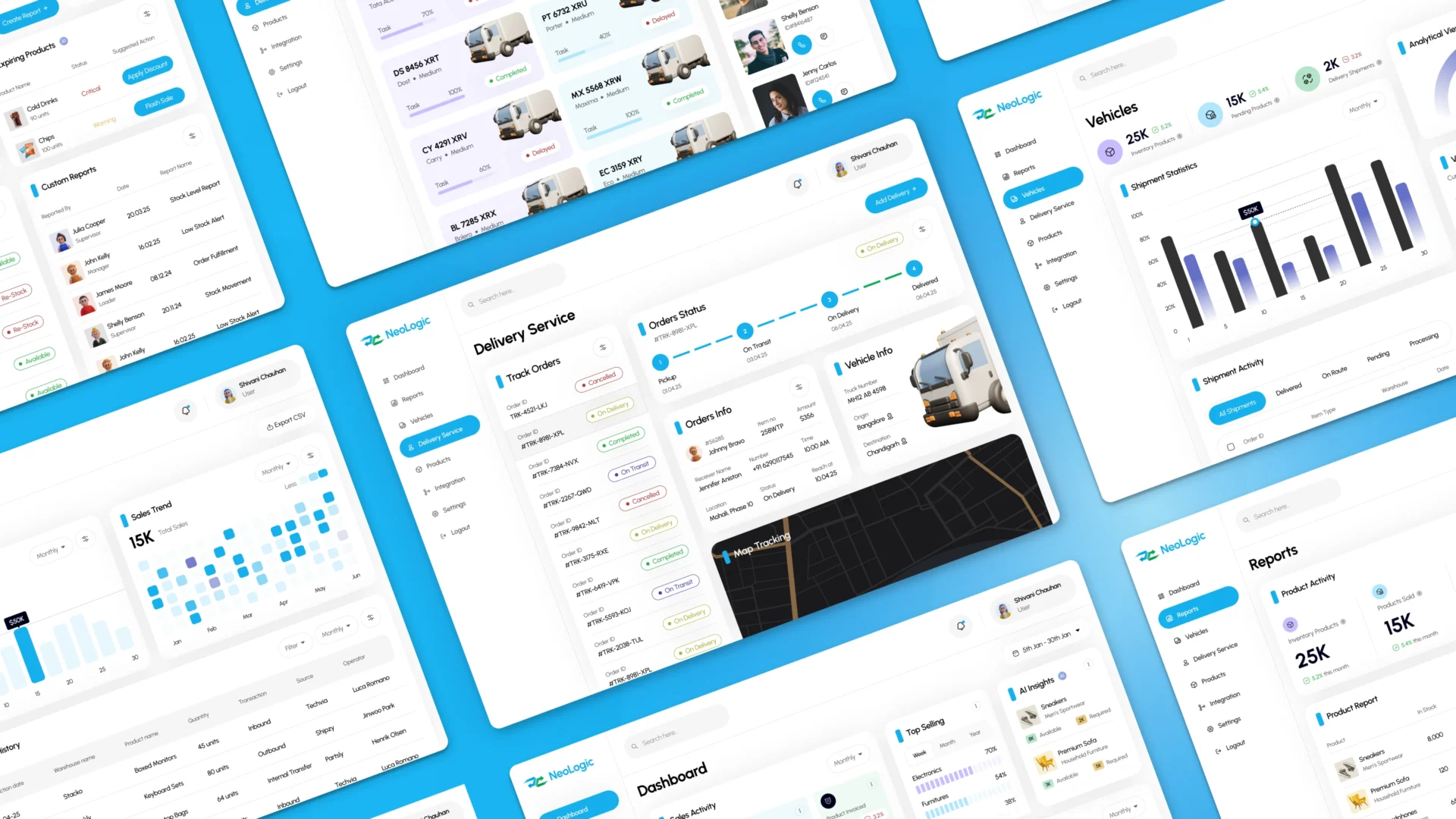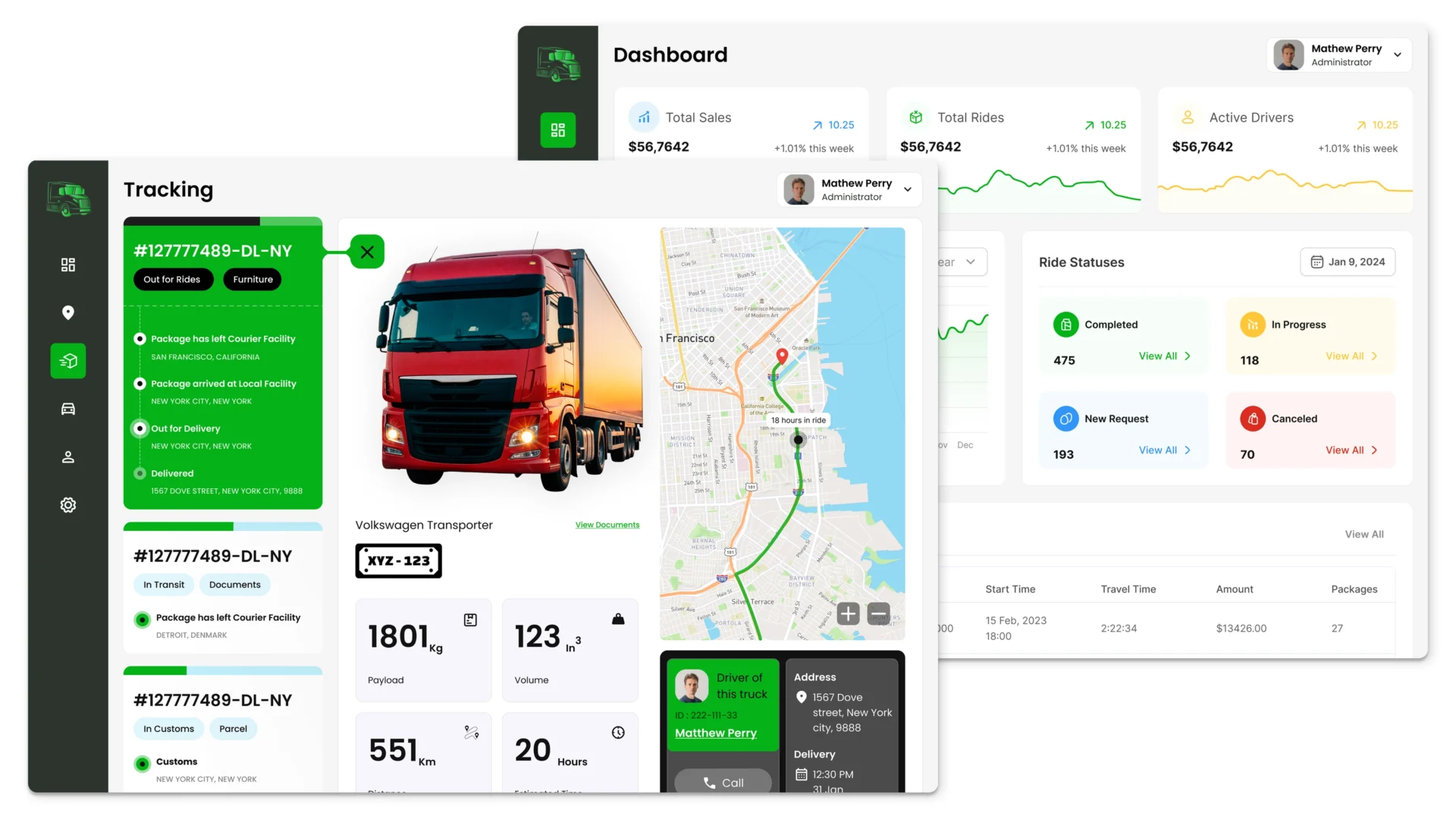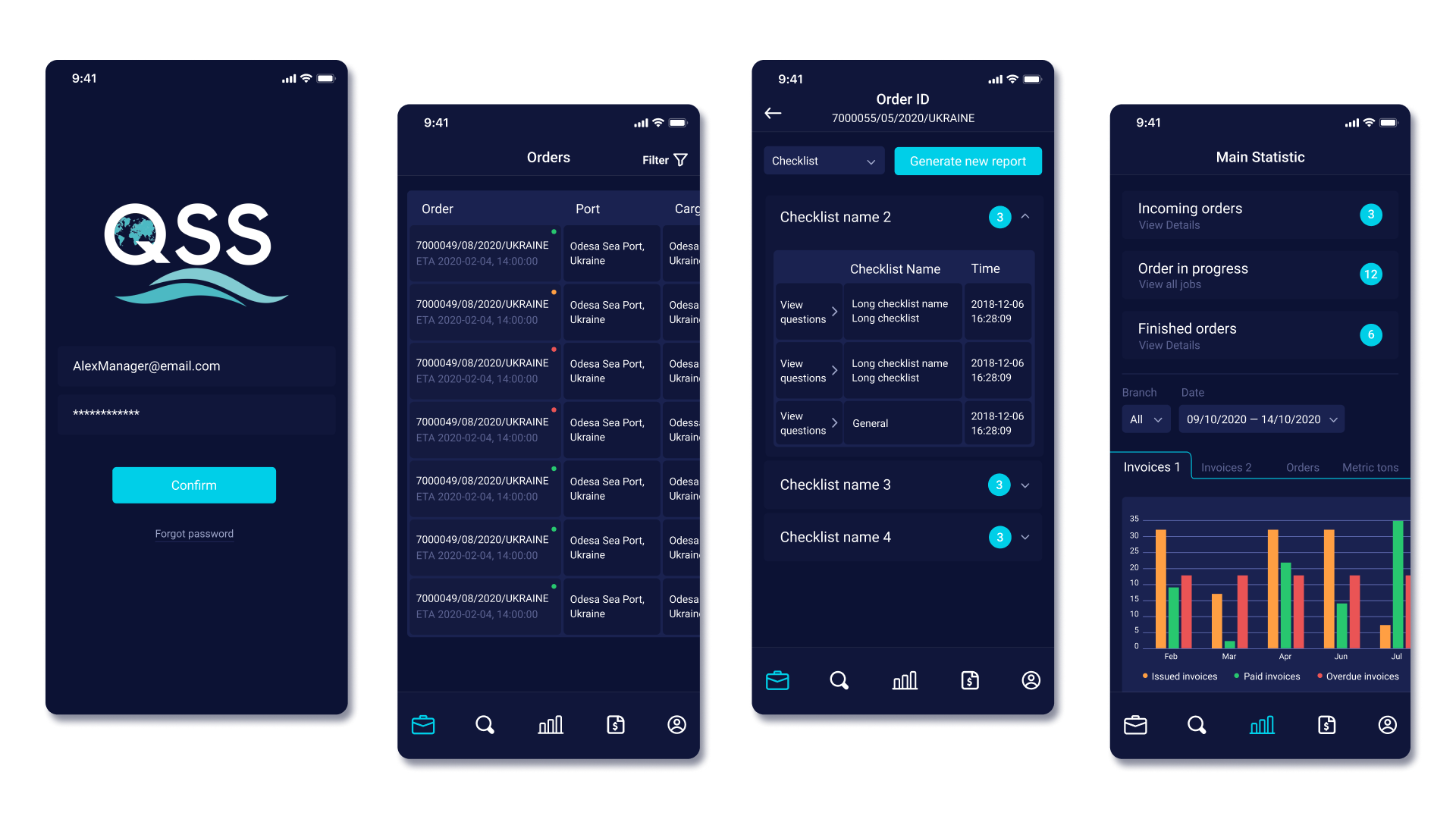
Logistics and transportation are among the most dynamic industries, where efficiency directly depends on accurate planning and the speed of response to changes. Cargo management, routing, fleet control, and interaction with clients and partners are all impossible to imagine without digital tools. In combination with TMS (Transport Management System) and WMS (Warehouse Management System), ERP and CRM solutions for logistics form the foundation of a digital ecosystem for managing business processes: they help companies work with large volumes of data, automate routine operations, reduce costs, and improve service quality.
Our experience in developing custom solutions shows that off-the-shelf systems cover only standard scenarios and quickly lose effectiveness as requirements grow. When a business faces complex industry specifics, non-standard integrations, or high SLA demands, a tailored approach and customization of functionality for specific workflows become essential. That’s why custom management systems allow companies not just to “digitize processes,” but to create a real competitive advantage.
In this article, we will explore how ERP and CRM systems help logistics and transportation companies build efficient management processes, what tasks they solve, and which functions are truly critical for business.
ERP (Enterprise Resource Planning) and CRM (Customer Relationship Management) are two key classes of systems that help logistics and transportation companies manage their resources and customer relationships. Despite their different purposes, together they create a unified digital environment where every operation is transparent – from route planning and warehouse stock control to customer communications and service quality management.
An ERP system acts as the “central brain” of a business. It makes it possible to:
For logistics, this means the ability to see the current situation in real time and make management decisions based on accurate data rather than assumptions.
CRM systems in logistics focus on the customer side of the business. They help to:
In a highly competitive market, CRM in logistics becomes the tool that helps retain clients and increase loyalty. At the same time, the full potential can only be unlocked through custom CRM development, where the functionality is tailored to the specific needs of the company.
Examples of CRM system screens for a logistics company
A CRM system for a transportation company becomes a tool that helps optimize internal operations and improve the quality of customer service.
Modern ERP and CRM systems for logistics are built on digital solutions that make processes transparent, flexible, and predictable.
The latest GPS modules and IoT devices (temperature, humidity, vibration, and fuel level sensors) make it possible not only to see the real-time location of cargo and vehicles but also to monitor their condition. For example, when transporting medicines or food, temperature sensors record even the slightest deviations from the norm and send a signal to the system. In the event of delays or downtime, the system automatically notifies the dispatcher and can adjust the route to minimize losses.
Big data collection systems analyze not only current routes but also transportation history: traffic jams, seasonal demand peaks, average customs clearance times, and fuel consumption by vehicle model. Based on this data, forecasts are created: where and when delays are likely, how to distribute orders between vehicles for optimal loading, and which route will be most cost-effective in terms of time and expenses. In essence, this is a predictive logistics tool that helps companies make decisions one step ahead.
Modern corporate logistics platforms connect with dozens of third-party solutions:
Such integration turns ERP/CRM into the “nervous center” of logistics, where data from different sources is combined. This eliminates gaps between separate stages of the supply chain, accelerates processes, and reduces the likelihood of human errors.

Efficient delivery in logistics is impossible without automation. Here, the combination of ERP and CRM plays a key role, enhanced by specialized systems such as TMS (Transport Management System) and EAM (Enterprise Asset Management). Together, they create a unified digital space: ERP manages resources and finances, CRM handles customer interactions, TMS is responsible for transportation planning and monitoring, and EAM ensures fleet maintenance and asset management.
Modern TMS solutions use algorithms that account for traffic jams, roadworks, client schedules, warehouse capacity, and even weather conditions. Sensors and GPS devices provide data about the situation on the route, after which the system suggests possible adjustments. The dispatcher makes the final decision, while IoT technologies ensure precise data for analysis. This approach reduces empty mileage and allows quick responses to changes, improving delivery efficiency.
Vehicle condition data is collected from onboard systems: fuel level, mileage, errors, and maintenance schedules. EAM manages maintenance planning and control, preventing breakdowns and reducing repair costs. In combination with TMS, the system also monitors driver work and rest schedules, helping to ensure compliance with regulations and maintain productivity.
TMS tracks SLA compliance for each trip and immediately signals risks of delays: border queues, equipment failures, or force majeure events. Integration with CRM allows customers to be automatically notified about delivery status, while ERP records financial consequences and updates analytics. This triple loop ensures not only route control but also full transparency for both businesses and their clients.
Real implementation cases show how ERP and CRM systems for logistics help companies reduce costs, speed up processes, and improve customer service quality. Below are two cases; you can explore many more examples in our portfolio.
A clear example from our portfolio is a project for Normandiсa, one of the largest auto-logistics operators in southern Ukraine.
Task: the business approached us for a comprehensive “turnkey” implementation-from the website to the CRM system and marketing setup.
Solution: we designed the CRM architecture and migrated the company’s key business processes into it. The system includes roles for administrators, managers, dealers, and accountants, as well as integrations with car auctions and internal services. In parallel, we built a modern website with delivery and customs-clearance calculators, an adaptive interface, and launched ad campaigns.
Result: the CRM system for the logistics company created a fully digital ecosystem where order management, customer operations, and marketing are unified in a single solution. This accelerated request processing, increased sales volume, and took the business to a new level.
We developed a web application for QSS, a company that inspects cargo on vessels of any type.
Task: the client needed a convenient tool for inspectors to record inspection results on site and promptly transmit data to customers.
Solution: we created a system where inspectors create task cards, add cargo photos and geolocation, and enter inspection and measurement results. A separate access level is provided for customers-they receive official PDF reports and can work with invoices inside the system.
Result: automation of inspections and document workflow reduced data processing time, increased transparency, and strengthened customer service.

Modern digital solutions in logistics do not operate in isolation but as an interconnected ecosystem. ERP is responsible for resources and finances, CRM focuses on clients and orders, and specialized modules integrate with fleets, warehouses, and external services. That’s why the CRM system, logistics operations, and warehouse management work in concert, forming transparent business processes and a unified management environment. This approach enables companies to control every stage of transportation, reduce costs, and improve service quality for customers.
Our team’s experience shows that universal off-the-shelf products are not enough here. Only a custom-built ERP or CRM can account for a company’s specific needs-from integration with GPS sensors and warehouse systems to automating document workflows and customer services.
Order a custom CRM for logistics from us and get a digital solution tailored precisely to your business case.
How does ERP differ from WMS and TMS in logistics?
ERP covers all company resources: finance, personnel, procurement, warehouses, and transport. WMS (Warehouse Management System) is responsible exclusively for warehouse management, while TMS (Transport Management System) manages transportation. Used together with ERP, they provide full control across the entire supply chain.
How much does it cost to implement a CRM for a transportation company?
The cost depends on the scale of the business, the number of integrations, and the level of customization. There is no universal price: for some, a basic solution for the logistics department is sufficient; others need a comprehensive ecosystem with ERP, CRM, and mobile applications.
To estimate the budget in advance and choose the best option for your needs, you can use our development cost calculator.
Do we need to use both ERP and CRM right away?
Ideally, use them together. ERP manages internal resources-warehouses, finances, fleet, procurement-while CRM handles the customer side: sales, service, and communications. Combined, they form a unified system where business processes and customer operations are interconnected. This helps avoid gaps, increase efficiency, and build a transparent logistics management ecosystem.
Can ERP/CRM be integrated with mobile apps for drivers?
Yes. Modern solutions support mobile apps, GPS trackers, and IoT sensors. Drivers can receive assignments, log trip completion, and send data to the system in real time.
As an example, consider AVA CRM – a chat-oriented mobile application with broad integration capabilities. It combines a messenger-style interface with full CRM functionality, runs directly in the browser, and works equally well on mobile and desktop devices.
Is CRM suitable for small logistics companies?
Yes. For smaller companies, we offer modular CRM systems for logistics that scale easily as the business grows. You can start with core functionality-CRM for order and customer management integrated with WMS/ERP (inventory, statuses)-and then gradually expand with new modules: fleet monitoring, analytics, and mobile apps for drivers. This approach avoids unnecessary upfront costs and lets you build the system step by step.
Contact the experts Have a question?
Developed by AVADA-MEDIA™
The user, filling out an application on the website https://avada-media.ua/ (hereinafter referred to as the Site), agrees to the terms of this Consent for the processing of personal data (hereinafter referred to as the Consent) in accordance with the Law of Ukraine “On the collection of personal data”. Acceptance of the offer of the Consent is the sending of an application from the Site or an order from the Operator by telephone of the Site.
The user gives his consent to the processing of his personal data with the following conditions:
1. This Consent is given to the processing of personal data both without and using automation tools.
2. Consent applies to the following information: name, phone, email.
3. Consent to the processing of personal data is given in order to provide the User with an answer to the application, further conclude and fulfill obligations under the contracts, provide customer support, inform about services that, in the opinion of the Operator, may be of interest to the User, conduct surveys and market research.
4. The User grants the Operator the right to carry out the following actions (operations) with personal data: collection, recording, systematization, accumulation, storage, clarification (updating, changing), use, depersonalization, blocking, deletion and destruction, transfer to third parties, with the consent of the subject of personal data and compliance with measures to protect personal data from unauthorized access.
5. Personal data is processed by the Operator until all necessary procedures are completed. Also, processing can be stopped at the request of the User by e-mail: info@avada-media.com.ua
6. The User confirms that by giving Consent, he acts freely, by his will and in his interest.
7. This Consent is valid indefinitely until the termination of the processing of personal data for the reasons specified in clause 5 of this document.
Send CV
Contact us in any convenient way for you:
+ 38 (097) 036 29 32